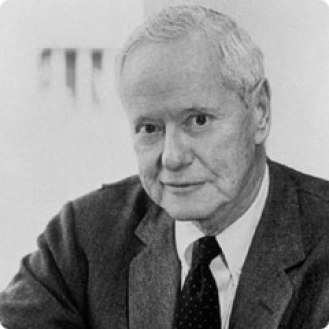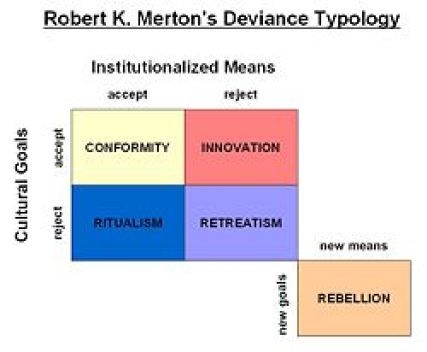Rejecting a Goal but Continue to Use the Legitimate Means of Achieving It
Crime is a result of a 'strain' between legitimate goals and lack of opportunities to achieve those goals.
Strain Theory argues that crime occurs when there aren't enough legitimate opportunities for people to achieve the normal success goals of a society. In such a situation there is a 'strain' between the goals and the means to achieve those goals, and some people turn to crime in order to achieve success.
Strain Theory was first developed by Robert Merton in the 1940s to explain the rising crime rates experienced in the USA at that time. Strain theory has become popular with Contemporary sociologists.

Strain Theory: The Basics
Merton argued that the cultural system of the USA was built on the 'American Dream' – a set of meritocratic principles which assured the American public that equality of opportunity was available to all, regardless of class, gender or ethnicity.
The 'American Dream' encouraged individuals to pursue a goal of success which was largely measured in terms of the acquisition of wealth and material possessions. People were expected to pursue this goal through legitimate means such as education and work. The dominant cultural message was if you are ambitious, talented and work hard, then income and wealth should be your rewards.
However Merton pointed out that these goals were not attainable by all, that the structural organisation of the USA mean that the means to get on were not fairly distributed and it was difficult, if not impossible for some to compete an achieve financial success.
Merton developed the concept of 'anomie' to describe this imbalance between cultural goals and institutionalised means. He argued that such an imbalanced society produces anomie – there is a strain or tension between the goals and means which produce unsatisfied aspirations.
Five Adaptations to Strain
Merton argued that when individuals are faced with a gap between their goals (usually finances/money related) and their current status, strain occurs. When faced with strain, people have five ways to adapt:
- Conformity: pursing cultural goals through socially approved means.
- Innovation: using socially unapproved or unconventional means to obtain culturally approved goals. Example: dealing drugs or stealing to achieve financial security.
- Ritualism: using the same socially approved means to achieve less elusive goals (more modest and humble).
- Retreatism: to reject both the cultural goals and the means to obtain it, then find a way to escape it.
- Rebellion: to reject the cultural goals and means, then work to replace them.

Merton developed his theory from a well-established observation from official statistics – that a higher proportion of acquisitive crime is committed by those from unskilled manual backgrounds (or 'lower social classes').
Merton noted that American society promoted material success as a 'legitimate goal', and encouraged self-discipline and hard work as the 'legitimate means' of pursuing that goal, with the idea that any individual, irrespective of their background could, with sufficient effort, achieve material success.
HOWEVER, Merton argued that for those from lower social classes, this 'dream' had become an ideology, masking the fact that the legitimate opportunities are not available to all, and worse, those who failed to achieve success via legitimate means were condemned for their apparent lack of effort.
This situation puts great pressure on people to achieve material success by illegitimate means (acquisitive crime) to avoid being branded a failure.
In short, Merton argued that America was a highly unequal and divided society which promoted goals that only some of its population could realistically hope to achieve. Many young, working class men especially had internalised the desire to achieve material success (they wanted cars and nice clothes for example), but the only way they could meet these goals was through crime.
Thus, it is not so much the individual's flaws that lead them to crime, but rather 'anomie' in society – the combination of the pressure to be materially successful and the lack of legitimate opportunities to achieve that success.
Criticisms of Strain Theory
- Firstly, not all working class individuals turn to crime, and so we need something else to explain why some of them do and some of them do not. Subcultural theorists argued that the role of working class subcultures plugs this gap in the explanation – deviant subcultures provide rewards for individuals who commit crime.
- Secondly, Merton's reliance on official statistics means he over-estimates the extent of working class crime and underestimates the extent of middle class, or white collar crime.
- Thirdly, Strain theory only really explains economic crime, it doesn't really explain violent crime.
- Marxists point out that lack of equality of opportunity is at the heart of the Capitalist system. (Elites make the system work for them, which disadvantages the lower classes).
The Continuing Relevance of Strain Theory
- Merton's strain theory is an important contribution to the study of crime and deviance – in the 1940s it helped to explain why crime continued to exist in countries, such as America, which were experiencing increasing economic growth and wealth.
- Baumer and Gustafson (2007) analysed official data sets in the USA and found that instrumental crime rates were higher in areas where there was a 'high commitment to money success' alongside a 'weak commitment to legitimate means'..
- It is possible to apply Merton's theory of anomie to explain White Collar Crime – white collar criminals (those who commit fraud at work, for example) might be those who are committed to achieving material success, but have had their opportunities for promotion blocked by lack of opportunities – possible through class, gender or ethnic bias, or possible just by the simple fact that the higher up the career ladder you go, the more competition for promotion there is.
- The (2009) applies Merton's strain theory to explain rising crime rates during a period of economic growth in Malaysia, suggesting we can apply this theory to developing countries and that a 'general theory of crime' may thus be possible.
- Philip Bourgeois (1996) In search of respect shows us that some of the most despised criminals have actually internalised Merton's success goals.
- Carl Nightingale: On the Edge – Carl Nightingale developed Merton's Strain Theory, applying it to inner city youths in the 1990s
Sources
Giddens and Sutton (2017) Essential Concepts in Sociology
This post offers a useful discussion and evaluation of Strain Theory
Crime and Deviance Revision Bundle for Sale
If you like this sort of thing, then you might like my Crime and Deviance Revision Bundle

The Bundle contains:
- 12 exam practice questions including short answer, 10 mark and essay question exemplars.
- 32 pages of revision notes covering the entire A-level sociology crime and deviance specification
- Seven colour mind maps covering sociological perspective on crime and deviance
Written specifically for the AQA sociology A-level specification.
Merton's Strain Theory is taught as part of consensus theory within the A-level sociology Crime and Deviance syllabus.
Other consensus theories include:
jaramilloyousbablet.blogspot.com
Source: https://overlz.com/what-do-you-call-it-when-it-involves-accepting-both-the-cultural-goal-of-success-and-the-use-of-legitimate-means-for-achieving-that-goal
0 Response to "Rejecting a Goal but Continue to Use the Legitimate Means of Achieving It"
Post a Comment